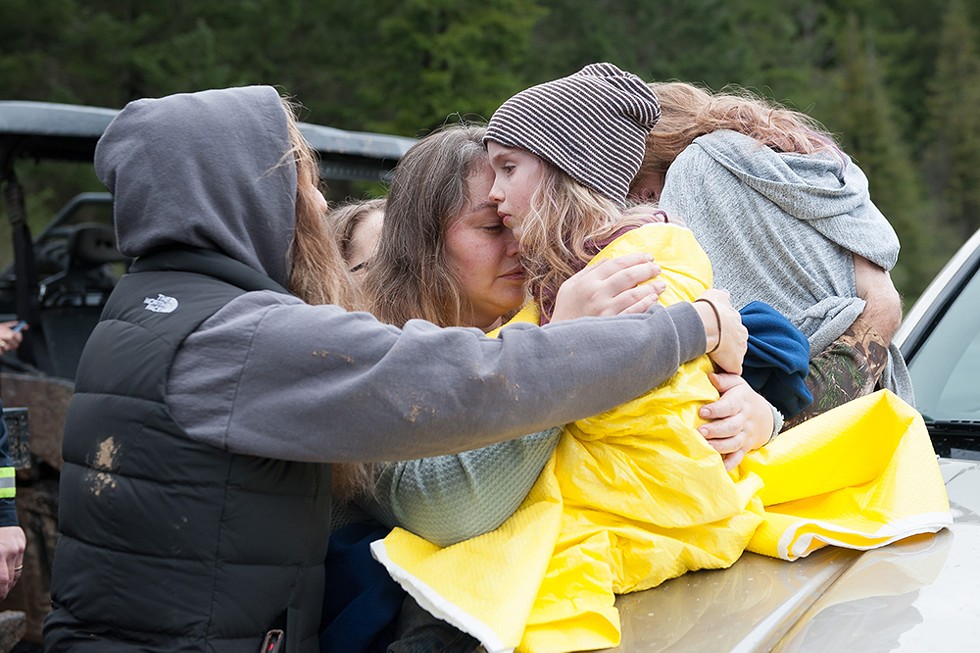Does it feel like 2019 was about seven years of news cycles crammed into 365 short days? That can't be just us. In Humboldt County, it was a year filled with conflict and hope, discord and solidarity, miracle and tragedy. As we collectively turn the page to a new year and a new decade, here's our look back at the top 10 stories of 2019, presented in no particular order. Did we get it wrong? Did we miss something? Let us know, either in the online comments or by sending a letter to the editor to [email protected].
See you in 2020, Humboldt. Thanks for making us a part of your 2019.

- Mark MCkenna
Sisters in the Woods
It was the weekend Humboldt County stood still. For more than a day, it seemed like the entire county and swaths of the nation waited with rapt attention to hear news about the missing Benbow sisters Leia and Caroline Carrico, 8 and 5, respectively. Forty-four hours after they were last seen, the chances of locating them safely having dimmed considerably after they spent another night lost in the woods, a miracle happened: They were found. Safe.
On Friday, March 1, the sisters wanted "a bit more of an adventure" and wandered into an 80-acre forest neighboring their home to follow deer tracks. Walking farther than they expected, the girls realized they were lost. By then, their mother had already discovered they were missing and a frantic search to find them had begun.
By the next morning, much of the county was on the lookout. Social media posts were shared and missing persons signs made, while search and rescue teams deployed at the break of dawn. Meanwhile, an investigative team was tasked with looking for signs of foul play. The FBI and California Highway Patrol were also standing by to receive news of a possible abduction. Multiple detectives were following credible leads across multiple jurisdictions over a 36-hour period with little to no sleep. Around 270 volunteers and 15 agencies from 17 counties, some from as far as south of Santa Clara County and east of Placer County, aided in the search to find them. No stone went unturned.
Using skills learned from their Miranda 4-H troop and advice from their parents, the girls hunkered down and managed to survive two nights in the cold darkness of the forest until a pair of volunteers found them.
It was indeed, as Humboldt County Sheriff William Honsal put it, "a miracle."
Iridian Casarez

- Jacqui Langeland
Tuluwat's Return
It was standing room only in Eureka's Adorni Center, which was filled with community sentiment and solidarity, as residents witnessed a historic moment of reparation and repatriation. A standing ovation filled the cavernous room Oct. 24 as the Eureka City Council passed a motion to freely return the sacred island of Tuluwat to the Wiyot Tribe. (Formerly called Duluwat, the tribe changed the island's name to Tuluwat after a sacred village site there.)
The tribe considers Tuluwat Island the center of the universe, a place with the power to bring balance to all else.
The unprecedented decision is part of an effort to make amends for when the island was stolen from the tribe on the night of Feb. 26, 1806. During the tribe's World Renewal Ceremony, a group of armed white men invaded the island and slaughtered Wiyot elders, women and children while they slept and the Wiyot men were away gathering supplies, becoming Humboldt County's bloodiest massacre.
After two years of negotiations with the tribe, the city of Eureka made history as the only municipality in the U.S. to voluntarily return land back to a Native tribe without an accompanying sale, lawsuit or court order.
Native people and allies hope the historic event will prove to be the starting point of discussions locally and nationally, having set a precedent for other municipalities to follow in returning lands to the tribes they were stolen from.
Iridian Casarez

- Courtesy Of Humboldt State University
New Man on Campus
It's hard to overstate the damage Humboldt State University President Lisa Rossbacher left in her wake when she walked off campus and into retirement in June. Her five-year presidency was defined by budget cuts, declining enrollment, allegations she didn't do enough to protect and support students of color and a series of controversial decisions to gut community institutions — KHSU, the school's football program and Third Street Gallery among them — that widened the town-gown divide.
Into the fray stepped Tom Jackson Jr., who started in July as HSU's eighth — and first black — president. From the moment he stepped on campus fresh off a four-year tenure helming Black Hills State University in South Dakota, the 59-year-old Jackson has been a vocal, forward-looking cheerleader for the university. The career administrator has pointed to HSU's ability to recruit and retain students — and a related student housing shortage — as the university's biggest immediate challenges. He's also pledged to bring an almost myopically student-centered approach to running the university.
Early returns from campus have been largely positive but it's clear HSU is at a critical juncture and history will look back on 2019 as either a turning point or a missed opportunity. Either way, Jackson's presidency promises to be a pivotal one.
Thadeus Greenson

- Mark Larson
Lawson Case
"I'm not going anywhere," Charmaine Lawson said in February after a Humboldt County criminal grand jury decided not to indict anyone in the case of her slain son David Josiah Lawson. Since his stabbing at an off-campus party on April 15, 2017, Charmaine Lawson has vowed to continue to keep returning to the county until she finds justice for her son.
It was supposed to be the year of hope and justice for David Josiah Lawson's case, as 2018 closed with the Arcata Police Department — after months of investigation — handing it over to Humboldt County District Attorney Maggie Fleming. But after a quietly convened criminal grand jury — that focused in on Kyle Zoellener, the McKinleyville man who was initially arrested as a suspect in the stabbing — decided not to indict anyone, the case went back to the Arcata Police Department for further investigation.
Along with supporters, Charmaine Lawson decried the grand jury's decision in a series of protests, demanding that the case be turned over to the California Attorney General's Office. In April, Fleming formally requested that the AG handle any future prosecution of the case as a response to Charmaine Lawson and what Fleming deemed a public perception tainted by "misinformation" in media coverage — alluding in part to the Journal's reporting of interim Arcata Police Chief Richard Ehle's saying APD's investigation had found "unequivocal physical evidence" linking a specific suspect to Lawson's death.
The California Attorney General's Office, however, announced earlier this month that it was declining to take the case, saying it did not find any evidence of "an abuse of discretion" by Fleming.
Charmaine Lawson nonetheless remains determined to find closure. "I will get Justice for my son," she wrote in a Facebook post celebrating the third annual Justice for Josiah Coat Drive.
Iridian Casarez

- JD Lasica
Impeachment and the Ascendance of Jared Huffman
Nationally, 2019 will surely be remembered as the year that — for just the third time in our nation's history — the U.S. House of Representatives impeached the president.
On Dec. 18, the House voted almost entirely along partisan lines to pass two articles of impeachment charging President Donald Trump with abusing his office and obstruction of Congress stemming from his attempts to pressure Ukraine into announcing investigations of the Bidens and the 2016 election, and then refusing to comply with House investigative subpoenas. In the New Year, Trump will stand trial in the Senate, which will decide whether to remove him from office.
North Coast Representative Jared Huffman, despite his rural district and relatively recent arrival on Capitol Hill, has proven a prominent voice in the national impeachment conversation. One of the first lawmakers to argue the House should launch an impeachment inquiry ("The Case for Impeachment," June 13), Huffman has been a vocal critic of the president and made the widespread media rounds to argue he should be held to account.
Meanwhile, with Democrats taking control of the House for the first time since he took office in 2013, Huffman seems to be making the most of majority life. A couple key committee assignments have elevated Huffman's profile and sway, as did his coming out as a non-religious humanist, making him the only sitting member of Congress who has publicly stated they don't believe in God.
Plus, as we say in newsrooms, the guy gives good quote — he recently told the Washington Post of Pelosi's handling of impeachment: "She's juggling chainsaws and kittens and doing it seemingly with perfect composure" — all but ensuring Huffman will continue having a voice in the national conversation in 2020.
Thadeus Greenson

- Jonathan Webster
Marketing Eureka
After shaking up its approach to welcoming visitors a few years earlier, the city of Eureka took the change of course full-board at the beginning of 2019.
For decades, the city had contracted with the Eureka Humboldt Visitors Bureau — formerly the Humboldt County Convention and Visitor Bureau — to market and promote the city, giving a portion of its transient occupancy tax to the cause.
But in mid-January word came that the city wanted to rebrand Eureka with a message solely focused on the city rather than as part of a group deal with the county of Humboldt and Ferndale in a campaign that largely focused on promoting the redwoods.
The stage for such a drastic change was set back in 2017, when the then city council ended its 40-year contract with the Greater Eureka Chamber of Commerce to run a tourism center out of a building on Broadway.
While a final break in tradition was initially delayed following the sudden death of Tony Smithers, the visitor bureau's longtime executive director, the council ultimately followed through and set out to find Eureka a consultant to call its own.
But it was not a smooth transition.
While local nonprofit Humboldt Made seemed set to take the title after a selection process, revelations surfaced in May that staff had materially misrepresented issues with the outfit's proposal that could have excluded it from the running in the first place.
In a stunning reversal, the city council voted June 4 to reject Humboldt Made's proposal and opted to give the $370,000 annual contract to the other finalist, Eddy Alexander, based in Virginia.
Kimberly Wear

- David Wilson
Dark Times in Humboldt
After hours of chaotic and conflicting information from PG&E, the entirety of Humboldt County went dark for 28 hours with little notice early in the morning of Oct. 9. A similarly scattered scenario played out two weeks later when the power company enacted another, even longer Public Safety Power Shutoff due to dangerous wildfire conditions in neighboring counties.
Each of the blackout announcements sent residents scrambling to withdraw cash, fill up gas tanks and buy supplies, causing long lines at gas stations, empty ATMs and cleared store shelves, in a desperate bid to stock up before the lights went out.
Still unclear is why a PG&E representative was relaying inaccurate information to the Humboldt County Office of Emergency Services for so long during the second outage that started Oct. 26 — erroneously leaving public officials, emergency service personnel and residents under the impression that a third blackout was looming as October came to a close.
What became clear were the vulnerabilities Humboldt County faces as the region — and the state — face a new normal of emergency power shutoffs, even if the fire danger is hundreds of miles away. Those include being cut off from the diesel supply used to power most of the county's backup infrastructure, from cell towers and hospitals to sewage systems and water pumps.
And then there was the social and financial cost, including the residents reliant on medical equipment whose lives were at risk and those who could not work or open their businesses due to the lack of power, as well as the many already strapped households that lost the food in their fridges and freezers in back-to-back blackouts.
For some businesses, it was the final straw, causing economic losses from which there was no way to rebound.
Now, with all of the uncertainty ahead in 2020, one thing seems sure: Public Safety Power Shutoffs are here to stay.
Kimberly Wear

- Courtesy of the Wiyot Tribe
Terra-Gen Turbulence
After months of emotional debate that culminated in a marathon 16-hour meeting, a proposal to build a large wind farm on the mountain ridges overlooking Rio Dell and Scotia was rejected Dec. 17 by a split board of supervisors.
The controversial Terra-Gen project had sought to build 47 turbines on the hillsides that are not only home to rare flora and fauna, but one section of which —Bear River Ridge — is a sacred ancestral prayer site of the Wiyot Tribe known as Tsakiyuwit.
What supporters saw as a concrete path to addressing the climate crisis by generating enough clean energy to power more than half of Humboldt County, opponents viewed as a "green washing," a money-making venture for an outside company that was using fear to sell its product with proceeds going to an umbrella corporation — Energy Capital Partners — that is heavily invested in fossil fuels.
In the end, Supervisor Mike Wilson was in the swing position and, like several of his fellow board members, expressed deeply conflicted feelings over the decision before casting his vote against the project along with supervisors Estelle Fennell and Steven Madrone, while supervisors Rex Bohn and Virginia Bass cast theirs in support.
The decision came down after last-minute pitches by Terra-Gen representatives to lessen the blow of the project by promising to hire local workers, pledging to put aside more than $2 million in remediation funds and offering $1 million for a community endowment that would go to the Wiyot Tribe.
Wiyot elder Cheryl Seidner had a resounding response to the offer.
"There's not enough money to do that," Seidner said, addressing her comments directly to Terra-Gen's representatives. "You would not sell your mother, we cannot sell our earth."
The project did not move forward but the climate crisis will. Humboldt County's next move is unclear.
Kimberly Wear

- Jonathan Webster
Economic Decay
Whether by blackout, contraction or some other means, 2019 brutalized Humboldt County businesses. From art galleries to eateries, local establishments were squeezed hard this year and many shuttered as a result.
Piante Gallery, Black Faun Gallery, Swanlund Photo, Natural Selection, Arcata Exchange, Mazzotti's in Old Town, Pasta Luego, Hanna, Masaki's Mongolian Grill, Folie Douce and Big Blue Café all closed this year, as did the nationally acclaimed Fire and Light. Owners of the historic Benbow Inn filed for bankruptcy protection in September, and the iconic Loleta Cheese Factory shuttered a few months later. Even Reggae on the River — the three-day music festival fundraiser that used to keep the Mateel Community Center's doors open throughout the year — went belly-up this year.
That's a lot of closures.
While some of them were simply the result of owners retiring, many were due to an economic downturn that has sales tax receipts down throughout the county, even as the economy has been on the rise statewide and nationally. Most point to changes in the local cannabis economy as the culprit, noting that legal farms are facing high permitting and compliance costs, while paying a hefty tax rate that's slimming their margins. This means less cash being spent in local stores and restaurants.
Then there were those PG&E blackouts — and the ones that were threatened but never came — that resulted in tens of thousands of dollars in losses for some businesses.
Plainly, most local business owners are probably pretty relieved to put 2019 behind them, though there's no indication things are going to pick up in 2020, with cannabis tax hikes and additional PG&E shutoffs on the horizon.
Thadeus Greenson

- Shutterstock
KHSU Goes Silent
With Russian composer Igor Stravinsky's "Requiem Canticles" playing on the air April 11, Humboldt State University's quirky, eclectic public radio station was unceremoniously gutted.
The selection was made by 32-year volunteer Ed Campbell, who hosted A Wandering Ear and had showed up at the station that day prepared for his 10 a.m. show to find his keycard no longer worked. He was reportedly let in by Vice President of University Advancement Craig Wruck to deliver his show.
It would be the last of KHSU's long tradition of community-based programing to broadcast.
As the requiem was playing, the station's staff and volunteers were grappling with the news that had arrived earlier that morning at a staff meeting called by Wruck to inform them of sweeping changes — including the "indefinite suspension" of community-based shows and the elimination of most staff.
The two staffers left standing would soon resign in protest. In less than 48 hours, the KHSU that the community had known and supported for decades was gone. For a brief bit, programming from Chico State University's station was used to fill the air space along with some syndicated fare.
Currently, management of the station is under a month-to-month operating contract with Sacramento-based Capital Public Radio.
Kimberly Wear





Comments